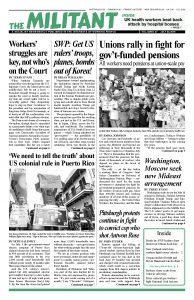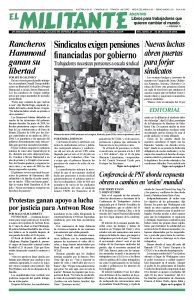July 26, 1993
Working people should demand Congress reverse its June 30 vote upholding the Hyde amendment, which bans federal funds for abortions. It denies millions of women — mainly working-class women — their right to decide when and whether to have children.
The right to choose abortion became legal in the early 1970s through the struggles of women and men who took to the streets in protest. It was the byproduct of the massive influx of women into the work force following World War II, as well as of the civil rights and the anti-Vietnam War movement. Affirmative action, abortion rights, and increased access to birth control won through these massive social movements helped to unify and strengthen the working class.
The battle over abortion rights and the fight to keep clinics open will continue to be decided in the streets and in front of the clinics themselves.
July 26, 1968
The Soviet bureaucracy has greatly stepped up its pressure to halt and, if possible, reverse the liberalization of the Czechoslovakian Communist Party and administration.
A note from Moscow and four East European governments siding with the Kremlin bureaucrats delivered to Prague July 16 stated, “This call represents a serious danger to the party, the national front and the socialist state … [the document’s purpose] is to legalize the platform of counterrevolution and hoodwink the vigilance of the party, the working class and all the working folk.”
But the real targets of “hoodwinking” are not the Czechoslovak people at all, who have been enthusiastic supporters of government reform, steadily pushing it to go further and further. By claiming that there is a big danger of counterrevolution in Czechoslovakia, the Kremlin bureaucrats are above all attempting to hoodwink the Soviet people themselves.
July 24, 1943
A greatly ballyhooed political campaign was initiated by the national leaders of the CIO last week. The CIO bureaucrats paint this campaign as an effort to mobilize labor’s ranks on the political field to beat back the growing anti-labor offensive in Washington. But its primary purpose is actually to head off and prevent the creation of an independent labor party through which the workers can successfully challenge the political agents of Big Business.
More and more workers have learned since Pearl Harbor that the economic problems of the labor movement can no longer be solved in the “normal” trade union manner. Price rises authorized and tolerated in Washington have more than nullified the wage raises won by the unions. Wage freezing and compulsory arbitration have put an end to collective bargaining as it was known and practiced before the war.

